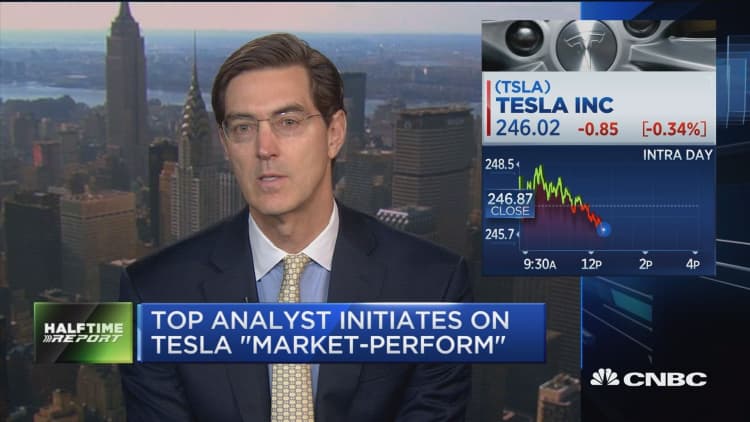
Bernstein analyst Toni Sacconaghi is torn over Tesla.
Sacconaghi is bullish on the adoption of electric cars and says Tesla's long-term vision for its energy business is compelling, but he also sees near-term challenges to both of Tesla's businesses.
Speaking on CNBC's "Fast Money Halftime Report," Sacconaghi expressed some concern over the size of Tesla's gross margins on the upcoming Model 3 sedan.
"Tesla has struggled to have healthy gross margins on the Model S and Model X today, and they sell for $100,000 on average," Sacconaghi told CNBC. "The Model 3 is expected to have a base price of $35,000" and an all-in price of $42,000 to $43,000, so "the required cost-down to have margins that are comparable is really significant, and we are not sure that Tesla can do it that quickly."
In addition, Tesla will have to spend about $3 billion to 4 billion in capital expenditures over the next year, and Sacconaghi expects Tesla will raise capital somewhere between the second and fourth quarters of this year.
Sacconaghi initiated coverage on the stock on Thursday, with a "market-perform" rating and a $250 price target. Tesla shares were trading down slightly at roughly $245 Thursday afternoon.
Sacconaghi explained how he arrived at his valuation, saying he "tried to look at what stocks trade at that have similar growth rates to Tesla. And when we applied those kinds of multiples for companies that have similar growth rates or similar margin profiles, we came up with a valuation that was pretty close to within striking range."
After that, he added, he tried to "envision the end state in 2050, and what might Tesla look like and again that's where we tried to think about, could they be as big as BMW, and if they were, what would they be worth? And if they were more profitable than BMW or larger than BMW what would they be worth?"
Tesla's SolarCity business, which the company acquired last year, adds "incremental risk" for Tesla, he said, especially since Tesla has already burned through $6 billion in cash since going public in 2010, and SolarCity will likely to also need cash in the near term.
Having said that, Tesla's long-term vision for an integrated, environmentally-friendly home is compelling, Sacconaghi said.
Tesla's battery business does appear to have both cost and first-mover advantages, but with competitors on the horizon such as the Chinese company BYD, which, like Tesla, also makes batteries and cars, it remains to be seen how long Tesla can hold on to its advantage in that area.
One thing Sacconaghi is not terribly concerned with is Tesla's record of falling short of some of its targets, such as on its production and delivery numbers. Investors have already recognized that pattern and have likely factored it into their expectations, he said.


